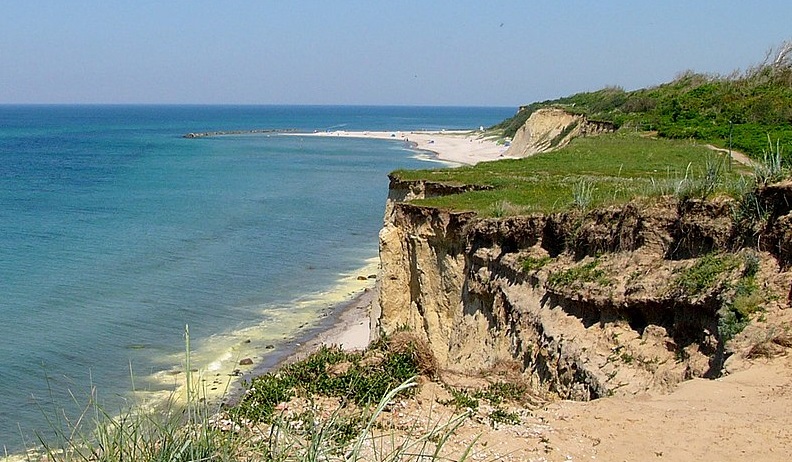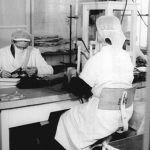
The Wall divided German-German societies, particularly in the travel market. West Germans and West Berliners were allowed to travel to almost any country in the world at any time. His home country didn’t care about his travels.
Things were very different in the GDR. Even with a visa, GDR citizens were only allowed to travel to the socialist brother countries. The West was taboo for most people. There were “travel cadres” who had permission to travel to the West, selected by their companies or universities for economic or scientific reasons. But there were only a few of them and some took the opportunity to escape.
On paper, GDR tourism was great. When the state was founded in 1949, the GDR wrote the “right to rest” and “to annual leave against pay” into Article 16 of the constitution for every worker. The “Handbook of the GDR” praised the socialist vacation system as a “great social achievement of the GDR”.
The procurement of resources was typical of the GDR. In 1953, a large number of police officers searched more than 700 private hotels, restaurants and guesthouses on the Baltic coast as part of “Aktion Rose”.
The absurd accusation: the hoteliers were selling “illegally imported Western goods” and working for the “agent headquarters of American imperialism”. At the end of the campaign, 440 owners were simply arrested as agents of the West.
60% of tourism in the GDR was organized by companies and the state. The FDGB vacation service organized around 2 million trips per year. The state travel agency of the GDR was a VEB, and the FDJ had its own youth travel agency from 1975. Anyone between the ages of 16 and 25 could book with Jugendtourist. However, it was known that older people were also taken along if there were still places available. And you had relationships.
In 1989, 34% of overnight stays were accounted for by company facilities, 26% by campsites, 19% by FDGB hotels, 17% by youth recreation facilities and 4% by others.
These official figures are deceptive. There is a lack of overnight stays in private accommodation, which accounted for the majority of overnight stays in the vacation season in places with high tourist traffic. These private tourists repeatedly caused noticeable shortages in the local supply of food and everyday goods in the vacation resorts.
For GDR citizens, worries about their summer vacation began in winter. The order forms for bus trips or for coveted trips abroad to the Eastern Bloc had to be received by the GDR travel agency by a fixed date. Out of 1,000 applications, only about 30 were approved. It was like winning the lottery, paid for with one of the coveted pink “FDGB vacation checks”. Statistically, the applicant only received this FDGB vacation voucher every five years.
Holidaymakers only had to pay a third of the costs themselves, and this also applied to the outward journey on the Reichsbahn. Two weeks full board in the Baltic seaside resort of Boltenhagen cost just 95 marks per person in 1965.
But the tone was strange. The vacation vouchers said “Induction to the FDGB vacation village” and the food was served in “catering points” The social security card had to be presented and sportswear was expressly expected. Many a person had to put up with the boss at a collective lunch. The level of comfort was manageable, the taps dripped, beds squeaked – and every morning the battle for the shared shower began. 10% of the GDR budget was spent on subsidized vacations, but supply never met demand.
Those who wanted to avoid the masses camped; in the end there were more than 500 campsites in the GDR, the largest with up to 5000 pitches. Those who were lucky had a caravan trailer such as the “Klappfix” or the “Campifix”.
The pitches were in great demand and had to be applied for months in advance at the Central Campsite Agency.
Even the socialist brother countries were not easy to travel to as a normal GDR citizen, starting with the foreign currency. The friendly countries were not keen on the GDR currency either. Tens of thousands of citizens queued for hours to apply for travel to Bulgaria, the CSSR or Hungary. If they were successful, they stuffed their Trabbis with food, as officially only a maximum daily rate could be exchanged. In the CSSR, for example, it was only 30 marks. The GDR traveler felt like a second-class holidaymaker when he suddenly met a West German at Lake Balaton.
And of course they wanted to avoid escapes. In 1968, the GDR set up an alternative route through the USSR for travel to the Balkans. You needed a transit visa for this. With this 3-day visa, the borders of the USSR became permeable for individual tourists, which in some cases led to unauthorized trips to the East. When applying for entry, you had to state the exact route and the individual daily destinations. There were areas that were closed to all foreigners for military reasons and you could get lost but also have mishaps and get stuck. Therefore, you had to report to the militia at your destination, who were informed of your arrival in advance. If this did not happen, a search operation was triggered.
Travel to Cuba was possible from 1973, but it was very expensive and almost exclusively reserved for cadres.
The majority of the group trips were made by plane, in exceptional cases by train (e.g. the adventure trip on the Trans-Siberian Railway from Moscow to Vladivostok). The flights always began and ended at the same airport. When abroad, you met a local interpreter, usually an agent of the respective secret service. Who, however, did not cooperate with the GDR tour guide.
The GDR travel agency was actually a branch of the Stasi. Most of the permanent representatives and chief representatives of the travel agency of the GDR and also the honorary tour guides worked as IM or agents of the MfS. The volunteers were paid for the trip, but had to use their vacation time to travel. Wives had to pay in full for the journey. If there were mishaps for which the tour guide was held responsible, he was personally liable for the damage. The GAU was a refugee on a trip abroad.
So it is no wonder that the tour guides constantly put pressure on the travelers. Always queue in alphabetical order and no unwanted contact with foreigners.
When the mass protests shook the GDR system in 1989, many wanted not only more democracy but also something completely unthinkable: “Visa-free to Hawaii!” In 1989, the Society for the German Language chose “freedom to travel” as the word of the year.


